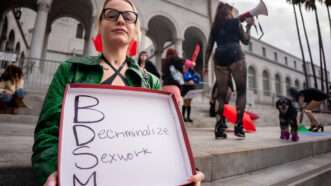Civil Liberties
On Abortion, Harris and Trump Were Both Right and Both Infuriatingly Wrong
Each candidate made some good points about reproductive freedom and each told some major whoppers.
On the Responsibilities That Come with the Freedom to Speak Freely
The best practitioners of the freedom of speech are those who do not assume that everyone who disagrees with them operates from bad motives.
Raphael Warnock Admits Laws Won't Stop School Shootings but Wants More Anyway
Often, the best thing for lawmakers to do is nothing.
The First Amendment Right To 'Greenmail' Developers
Plus: The Montana Supreme Court rescues zoning reform, and a new challenge to inclusionary zoning.
Unfortunately There's a Debate Tonight
Plus: Columbia's outside agitators, E.U. antitrust crackdown prevails, and more...
9th Circuit Partly Upholds Injunctions Against Location-Specific Gun Bans in California and Hawaii
The ruling says some restrictions on guns in "sensitive places" are constitutionally dubious but upholds several others.
Court Lets Plaintiff Suing Over "Pro-Hamas Demonstrations at Northwestern" Proceed Pseudonymously
Plaintiff had alleged that being publicly identified would put him at risk of physical harm.
Ruth Shalit Barrett's Defamation Lawsuit Against The Atlantic Survives in Part
The opinion includes some interesting discussion of defamation by implication.
Journal of Free Speech Law: "Speech Regulation and Tobacco Harm Reduction," by Jonathan H. Adler & Jacob James Rich
The final article from the Information as Medicine symposium.
The War on 'Foreign Influence' Has Become a War on the First Amendment
Go after bribes and espionage, but leave mere speech alone.
Journal of Free Speech Law: "Freedom of the Test," by Prof. Alex Tabarrok
An article from the Information as Medicine symposium.
Free Speech and the Educational Mission
Some of the hardest free speech issues arise when a university argues that restrictions are justified by its "educational mission."
QAnon "Patriot Reporter" Claims Newspaper Libeled Him by Saying He Had Admitted to "Sexual Relationship" with 15-Year-Old
But he loses: "As a result of Godlewski's guilty plea to 'inappropriate text [m]essages' and 'contact' ..., as set forth in the Affidavit of Probable Cause quoting the offending text messages admitting and memorializing a sexual relationship with a 15-year-old minor, Godlewski is collaterally estopped from denying his participation in [the] sexual relationship ...."
1 in 3 College Students Say Violence in a Campus Protest Can Be Acceptable, Survey Finds
The survey of over 50,000 students also found that 37 percent of students said it was "sometimes" or "always" acceptable to shout down a speaker, up from 31 percent last year.
A Georgia Teenager Killed 4 People at His High School. Why Is His Father Charged With Murder?
The case is another example of stretching criminal laws to hold parents accountable for their children's violence.
Journal of Free Speech Law: "The NIH's Genomic Data Sharing Policy and the First Amendment," by Prof. Adam Candeub
An article from the Information as Medicine symposium.
Claim That Someone Is "Racist" or "White Supremacist" Is Opinion and Thus Not Libel, Though …
claims that someone has engaged in specific conduct may be factual assertions and therefore potentially libelous.
No, Not That David Sackler; No, Not That State Law
Law students: Take that Choice of Law (often called Conflicts of Laws) course your law school offers; it can be tremendously important.
'Sometimes You Need a Strongman,' Trump Declares
The former president's attempts to put a positive spin on the term are consistent with his alarmingly authoritarian instincts.
Kamala Harris vs. Elon Musk
The Democratic nominee has favored policing online speech. Would a future Harris administration defend free expression?
Fire Department Chaplain Fired for Blog Post About Transgender Controversies Can Go Forward With Lawsuit
The chaplain's post "discuss[ed] 'how God designed each person as male or female, and that sex is immutable'" and "stated it is unfair to allow males to compete in women's sports."
California Social Media Platform Reporting Mandate Likely Violates the First Amendment
The mandate required platforms to, among other things, report to the state "how the terms of service define and address (a) hate speech or racism; (b) extremism or radicalization; (c) disinformation or misinformation; (d) harassment; and (e) foreign political interference, as well as statistics on content that was flagged by the social media company as belonging to any of the categories."
N.Y. Community Education Council Speech Restrictions Likely Violate First Amendment
"The Community Guidelines' prohibitions of, inter alia, 'homophobia, transphobia, misogyny, ableism, racism, or any other forms of oppressive beliefs or behaviors,' 'name-calling,' and 'disrespect' are prohibitions against ideas that offend, and therefore discriminate on the basis of viewpoint in violation of the First Amendment."
A Federal Judge Says Carry-Permit Holders Have a Right to Armed Self-Defense on Public Transit
The ruling concludes that the government failed to show an Illinois ban is "consistent with this Nation's historical tradition of firearm regulation."
An Arizona Mom Was Arrested for Criticizing Public Officials at a City Council Meeting. Now She's Suing.
Rebekah Massie criticized a proposed pay raise for a city attorney. When she refused to stop, citing her First Amendment rights, the mayor had her arrested.
The First Amendment Is an Arms Control Agreement
One of the functions of the First Amendment is to create a kind of arms control agreement: With respect to censorship, all sides agree to lay down their arms.
Is Free Speech Doomed in Hong Kong?
Last week’s sedition conviction is yet another step backward for press freedom.
The Soft Totalitarianism of the Political Class
Officials pursue an anti-liberty agenda through unofficial pressure and foreign regulators.
How Should the U.S. Respond to Hamas Executing Americans?
Plus: A listener asks the editors, when it is right to revolt to stop repeated miscarriages of justice?
This Texas Woman Was Jailed for Her Journalism. Is She the Future of Media?
Priscilla Villarreal, known as "Lagordiloca," is suing law enforcement for violating her First Amendment rights. She is appealing to the Supreme Court.
Campus Free Speech, 2024
For free speech on campus, Brandeis and Holmes should guide colleges and universities.
$1.85M Award in #TheyLied Lawsuit Over False Accusation of Rape
The award consisted of $1.5M compensatory damages and $350K punitives.
Massachusetts Switchblade Ban Overturned on Second Amendment Grounds
The Second Amendment doesn’t protect guns; it protects the human right to self-defense.




















